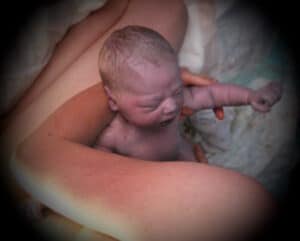 I read the Facebook post announcing that my friend had given birth: baby came early…boy…Down syndrome…
I read the Facebook post announcing that my friend had given birth: baby came early…boy…Down syndrome…
I opened the comment box and sat with my fingers poised on the keyboard. I didn’t know what to type.
I started scrolling through other people’s comments, hoping for clues about the right response.
“Congratulations,” her other friends had said.
Oh. That made sense. My friend had given birth! To a child she would love dearly! I should say, “Congratulations.”
My finger hovered over the letter C but didn’t type. My friend was probably experiencing one of the greatest disappointments of her life and she had so many more challenges ahead. Challenges that she would handle beautifully—I knew that. And yet…
I stared down at my own pregnant belly. I had so many hopes for the baby growing in my own womb, many of which would be dashed if the baby were born with a condition like Down syndrome. And he could be, I thought. The blood work had not ruled it out.
My husband had mentioned photos. Where were the photos? I scrolled down until I found them. He was cute. I clicked, “Like.” That wasn’t hard.
I know some people with Downs and I do like them. I worked at a group home and as a job coach for people with disabilities when I was a college student. I wasn’t one of those unenlightened people who hated or feared people with disabilities. Of all people, I should be able to express joy at the birth of a child with Down syndrome.
If, after all my experience, I couldn’t congratulate a mother of a child with Downs, how many people would discount and discriminate against this sweet new baby? I feared for him until I remembered all those comments.
I scrolled through the comments. There were so many. I started counting. Fifty, sixty, seventy people who knew how to congratulate my friend. Seventy people whose fingers didn’t freeze on the keyboard. What was wrong with me? Why couldn’t I say, “Congratulations”? My tears blurred the screen and I stepped away from the computer.






5 Responses
Oh my. It’s wondrous and terrible – this life – isn’t it. Thank you, April.
I really love your honesty here, April. I’ve had times in my life where I have had to do my own mourning before I’ve been able to be there for a friend. Thank you for sharing your vulnerability here.
I have a sister who was born with complications that weren’t discovered until later. After the doctors’ diagnosis, my mom talks about days where she would clean the house with me and my baby sister singing, “Onward Christian Soldiers” through her tears. There are dark days ahead, which I think, make it hard to say something that feels untrue in the moment. It takes time and grieving before I can remember that there will also be days of joy and triumph.
Thank you for this powerful post, April. As I was reading it and discussing it with my husband, we talked about a friend of ours who had a stillborn child years ago. She and I were close at the time, and the darkness and sense of loss –well, still haunts me. But I recalled this, because she said that she shared her hospital room (in the maternity ward! Ack!) with a woman who had just given birth to a Downs baby. This woman cried, but testified that God knew that she could mother a Downs child. My friend consoled herself in a way, in thinking that she could somehow find a way to survive the emotional and physical pain of the stillbirth, but she did not think she could mother a Downs baby. In some strange way, I think this thought soothed her.
I also thought to over a decade ago, when I saw an online list of adoptable children. I became attached to a child who had Downs, and became almost fervent that we needed to adopt him. He was from another country and a dozen other factors prevented this at the time. One of the driving sensations I had in my desire to adopt this boy was, “who is going to love him? Even his birth mother didn’t love him! I love him! I can love him!” It seemed for me that my spirit spoke to his spirit- and I wept bitterly thinking no one would love him.
Perhaps that is why so many people did offer congratulations—because they were not expectant mothers, because saying congratulations didn’t come with addressing the fears that expectant mothers fervently pray about. In a nutshell, I believe it would have been significantly easier to say congratulations for those not expecting. And in a way, I think for others, “congratulations” really meant love. Energy. New direction. Support. Compassion. Commiseration. All the things that would be said at some stage. But to start, it was left at “congratulations” to focus on the celebration that should come with birth.
Thank you for this.
So many wise words here–both in the post and in the comments. Thanks to all of you for your honesty and for being so considerate with your words.
For all the good feelings the word “congratulations” holds, it’s not the only way to welcome a new person/new experience/new way of thinking into the world. Through your own fear, and your own empathy, I believe you’ll be able to serve your friend and her child in ways they, and you, will all need.
I feel like I’m not very good at knowing what to say when people are having difficult or unexpected things happen, so I can really relate to this. The ideal of mourning with those that mourn and bearing each other’s burdens is often on my mind, but I also worry I’ll somehow make things worse by saying or doing the wrong thing. I also wonder if mourning with someone matters if they don’t know I’m mourning? And how do I let them know I am? I am rambling a bit here, sorry about that. Thanks for a post that didn’t wrap up neatly with a comfortable answer. Life is often like that.